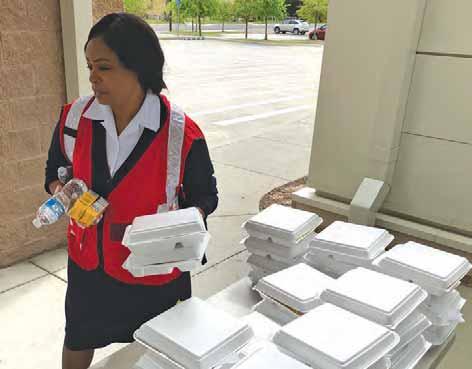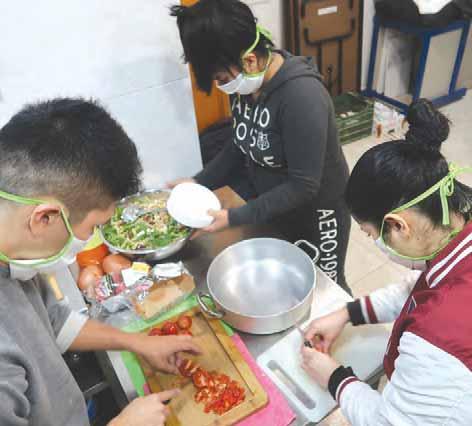
6 minute read
Army steps up worldwide response to pandemic
FLEXIBILITY and adaptation characterise the Army’s response in communities around the world impacted by the coronavirus pandemic. The Movement is meeting new needs while endeavouring to maintain its services for vulnerable people, often amending practices to meet the necessary guidelines and legislation to curb the spread of the virus.
AFRICA
The Army in Congo (Brazzaville) is preparing a programme to increase knowledge about Covid-19 and equip individuals with practical disease-prevention measures. Handwashing material will be given as part of the initiative.
The Liberia and Sierra Leone Command has taken initial safety measures to help protect officers, employees, centres and schools. The Army is planning an intervention strategy for awareness, prevention and care for victims in the coming days. A social media platform is being set up for sharing preventative measures, awareness and updates on the virus.
In Zambia, the Army has issued a five-point plan to Salvationists and friends: Pray, Listen, Clean, Care and Act. Territorial leaders Colonels Ian and Wendy Swan observe that it is ‘especially important that we remain aware of the spiritual and physical needs of our communities’.
AMERICAS AND CARIBBEAN
Salvation Army-run children’s homes in Jamaica have adapted by providing residents with online teaching tools to enhance the materials given by schools. Technology is also being used to give access to Bible study materials and online opportunities for worship.
In Argentina, the Army’s Buenos Aires Social Services Office is distributing bags with non-perishable food and necessities to people with limited resources.
In Uruguay, Burger King has supported Salvation Army personnel in offering food parcels to families in need. Major Elena Miño’s team is going house-to-house with the packages.
While professional baseball may have been halted across the USA, the Atlanta Braves first baseman, Freddie Freeman, has donated $25,000 to the Army’s coronavirus response in light of the Greater Atlanta thrift stores having to close. As in many areas, staff and volunteers in Lewisville are creatively making necessary adjustments to continue essential services for the community. Lunch each day is being delivered ‘to go’ with more than 75 clients picking up a free lunch. One-on-one case management meetings are taking place in the mobile kitchen.
With the temporary closure of Universal Studios in Orlando, Florida, perishable food items have been donated to the Army. A truckload of apples, oranges, potatoes and other fresh produce is greatly assisting Army staff to help those affected by the coronavirus outbreak, particularly shelter residents and drop-in clients in need. The Army is serving a free community dinner every weekday and has given fresh produce to nearly 300 senior citizens.
‘We have been serving the populations most vulnerable to the pandemic, people experiencing homelessness and senior citizens,’ says Orlando Area Commander Captain Ken Chapman. ‘This generous donation means we can serve so many more in need.’
EUROPE
In the Czech Republic, contingency plans are seeing Salvation Army hostels remaining open 24/7 to ensure that residents are not putting themselves or others at risk through unnecessary social interaction.
Kindergartens run by the Army in Finland are operating under the direction of the national government, and are providing care for the children of families whose parents work in key areas such as social work, healthcare and the fire and rescue service.
Retirement homes operated by the Army in France have remained open, but visits have been prohibited. Food provision continues in Paris.
Young people connected with the Army in Georgia have been distributing care packages to older people in their community.
In Dresden, Germany, the city council has placed vehicles and drivers at the Army’s disposal to deliver food to people experiencing homelessness. Creative approaches are being deployed to help families, such as a corps playground being opened to one family at a time. A children’s outreach team that usually uses drama as part of its programme has made material available on Spotify.
In Greenland the situation is compounded by heavy snow and daytime temperatures well below freezing. The Army is partnering with Kofoeds Skole and the Sermersooq municipality to achieve a holistic response. Hats, mittens, scarves and socks are being given with food wherever possible.

Greenland
The Army’s efforts in Italy have featured on national television. Online programmes and activities have been launched to help residents of the Virgilio Paglieri centre combat the stress and isolation of being restricted to their rooms.
A temporary day and night shelter for people experiencing homelessness was reopened in just two days by the Army in the Netherlands. The centre will support up to 30 people. In Almere, a mobile grocery shop serves elderly and disabled people.
The Army in Norway continues to meet needs in Oslo, where a mobile canteen has been deployed to distribute food. The canteen is providing sustenance for 100 families and individuals each day. The service is being bolstered by a telephone service for people to call for information and help. Elsewhere in the country, the Army in Rodeløkka will deliver food, providing a ‘to go’ option three days a week.

Spain
In Lisbon, Portugal, the Army’s overnight homeless shelter is being converted into a 24-hour shelter, in conjunction with local authorities as part of the government’s plan to protect the homeless population. This will reduce unnecessary movement throughout the city.
Salvation Army volunteers in Dénia, Spain, are continuing to give emergency food to at-risk groups. Due to a shortage of protective equipment, they are improvising with plastic bags rather than gloves on their hands.
Extensive operations are under way in Sweden to meet growing needs. The Army in Stockholm has adapted its breakfast and hot coffee for its vulnerable service users so that pre-packaged sandwiches can be taken away instead. Grocery supplies are also being given out. The extended provision of emergency accommodation continues. Netz4, Chrischtehüsli and the Evangelical Methodist Church have joined forces with the Army in Switzerland to ensure the containment of coronavirus while giving people at the margins of society vital support. Pastoral support is being offered via a special phone line.
In Latvia, the Army’s 11 soup kitchens have continued to prepare food for distribution in plastic containers.
Despite a state of emergency in Romania, corps members have been checking up on individuals and family members known to them.
Due to supply chain problems, the Army in Belgium has taken the unusual step of asking supporters to use their sewing skills to make new face masks to an approved design.
Meanwhile, in Estonia, the Army’s rehabilitation centre has amended its soup kitchen provision to give nutritious meals outdoors while maintaining social distancing.
SOUTH ASIA
The Army’s Mirpur Clinic in Bangladesh – which usually focuses on treating tuberculosis and leprosy – is gearing up to support patients presenting with coronavirus symptoms. The Army is planning to provide awareness material and a starter hygiene pack to around 2,500 people.
Evangeline Booth Hospital in Ahmednagar, Maharashtra, run by the India Western Territory, has had one of its wards declared by the government as an isolation ward for coronavirus patients.
SOUTH PACIFIC AND EAST ASIA
In Singapore, dedicated volunteers and staff from the Army’s Family Support Services team have been distributing food rations to frail and elderly people. Although elderly day centres across the city-state have closed, Salvation Army social workers are continuing to check in on service users over the phone and provide any necessary help.
Healthcare company Johnson & Johnson has collaborated with the Army in Korea to distribute 20,000 face masks and 4,000 emergency relief kits to vulnerable individuals and medical professionals. Each kit includes five masks, disinfection tissues, hand sanitiser, hand cream, mouthwash and body wash.
With the closure of all schools in Japan, one unintended consequence is that a significant number of children are going without lunches. Corps in strategic locations have stepped in to provide midday meals, meeting basic needs as well as giving children a carefully-managed opportunity to enjoy interaction in small groups. – AR
The latest video message from General Brian Peddle can be viewed at vimeo.com/ salvationarmyihq or facebook.com/ GeneralBPeddle







